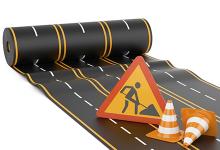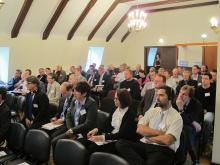One of the ERF’s principal tasks to is act as a platform for sharing best practice between countries in the field of road safety. While this activity has traditionally been handled at the European Union level, the current gloomy economic environment within Europe has forced the ERF to rethink its mandate and make the promotion of expertise a priority
It is in this context that the ERF, in cooperation with the state company Russian Highways - AVTODOR - joined forces to organise a landmark event in the fie
One of the ERF’s principal tasks to is act as a platform for sharing best practice between countries in the field of road safety. While this activity has traditionally been handled at the 1116 European Union level, the current gloomy economic environment within Europe has forced the ERF to rethink its mandate and make the promotion of expertise a priority
It is in this context that the7575 ERF, in cooperation with the state company Russian Highways - 3974 AVTODOR - joined forces to organise a landmark event in the field of road infrastructure. Organised within the context of the Doroga Expo 2014, the event gathered around 125 experts and represented a milestone for both organisations in terms of sharing knowledge, expertise and good practice within Russia and Europe. The ERF delegation was headed by Vice-President Jean-Claude Roffé (Colas) and Director General Christophe Nicodème. Together with AVTODOR Chairman Sergey Kelbakh and First Deputy Innokenty Alafinov, they took part in the discussions.
The seminar was divided into sessions that addressed the main achievements and challenges for both organisations. The first introductory panel focused on the financial and legal framework in Russia and the EU. The example of the new EU Directive on Public Procurement - to be implemented in two years - could present interesting opportunities for the European road sector.
The directive could foster the development of higher-quality, better-performing as well as more resilient and durable techniques and products for the EU marketplace that could also benefit the Russian road network. AVTODOR, too, is looking ahead with the launch of an ambitious public-private partnership programme and is seeking EU investors to consolidate its main road network.
In the second part of the seminar, discussions focused on road safety plans and standards for road elements, such restraint systems, road markings and traffic signs. In the EU, the Directive 2008/96 has proved successful for curbing road fatalities in recent years by combining audits, inspections and road safety assessments. Their implementation and adaptation by AVTODOR could also benefit the Russian road network.
There was a particularly lively debate regarding road restraint systems and the development of EN and GOST standards for roadside safety. Discussions addressed standardisation, correct implementation, performance assessment and validation by independent notification bodies.
The seminar continued with a double presentation of road safety practices designed to reduce accidents in work zones. The ERF presented a summary of its coming paper “Towards Safer Work Zones in Europe”, which lays out a series of recommendations on minimum safety and technical performance indicators for elements used in work zones. AVTODOR has already developed a standard for work zones, which has been used on its motorway network for the past several years.
AVTODOR Managing Director Nikolay Bystrow highlighted, in his presentation, increased cooperation between his organisation and the ERF. This was later cemented with the signing of a Memorandum of Cooperation on Road Safety by AVTODOR Chairman Kelbakh and ERF Director General Nicodème.
The cooperation agreement will facilitate the exchange of best practice and technical expertise that will boost road safety in the EU and Russia and will go a long way to achieving targets set by the EU Road Safety Action Programmes and the UN3439 Decade of Action for Road Safety.
It is in this context that the
The seminar was divided into sessions that addressed the main achievements and challenges for both organisations. The first introductory panel focused on the financial and legal framework in Russia and the EU. The example of the new EU Directive on Public Procurement - to be implemented in two years - could present interesting opportunities for the European road sector.
The directive could foster the development of higher-quality, better-performing as well as more resilient and durable techniques and products for the EU marketplace that could also benefit the Russian road network. AVTODOR, too, is looking ahead with the launch of an ambitious public-private partnership programme and is seeking EU investors to consolidate its main road network.
In the second part of the seminar, discussions focused on road safety plans and standards for road elements, such restraint systems, road markings and traffic signs. In the EU, the Directive 2008/96 has proved successful for curbing road fatalities in recent years by combining audits, inspections and road safety assessments. Their implementation and adaptation by AVTODOR could also benefit the Russian road network.
There was a particularly lively debate regarding road restraint systems and the development of EN and GOST standards for roadside safety. Discussions addressed standardisation, correct implementation, performance assessment and validation by independent notification bodies.
The seminar continued with a double presentation of road safety practices designed to reduce accidents in work zones. The ERF presented a summary of its coming paper “Towards Safer Work Zones in Europe”, which lays out a series of recommendations on minimum safety and technical performance indicators for elements used in work zones. AVTODOR has already developed a standard for work zones, which has been used on its motorway network for the past several years.
AVTODOR Managing Director Nikolay Bystrow highlighted, in his presentation, increased cooperation between his organisation and the ERF. This was later cemented with the signing of a Memorandum of Cooperation on Road Safety by AVTODOR Chairman Kelbakh and ERF Director General Nicodème.
The cooperation agreement will facilitate the exchange of best practice and technical expertise that will boost road safety in the EU and Russia and will go a long way to achieving targets set by the EU Road Safety Action Programmes and the UN






